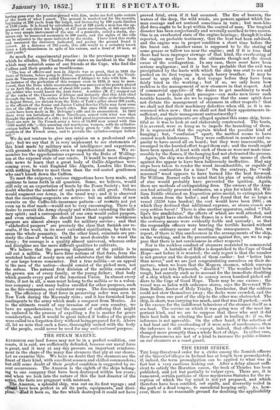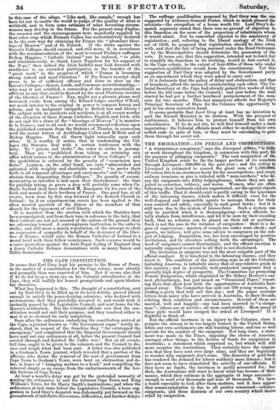THE IRISH STRIKE.
Tm long-threatened order for a strike among the Romish officers .of the Queen's Colleges in Ireland has at length been promulgated; if, indeed, the term promulgation can be applied to what was in fact but a very cautious leaking out. After a delay almost suffi- cient to satisfy the Horatian canon, the book of Thurles has been published, and yet but partially to vulgar eyes. There are, it is rumoured, certain portions of those mysterious Statutes for the re- ception of which the lay mind is not yet prepared, and which therefore have been confided, sub sigillo, and discreetly veiled in the garb of a dead tongue, to sacerdotal keeping only. As, how- ever, there is no reasonable ground for doubting the applicability
in this case of the adage, " Like sack, lice sample," enough has been let out to enable the world to judge of the quality of what is withheld, and to form some estimate of what favouring circum- stances may develop in the future. For the present coup d'eglise, the occasion and the encouragement were manifestly supplied by that other coup which Primate Cullen has authoritatively declared to be the sure way for obtaining for France the " abundant bless- ings of Heaven" and of St. Patrick. If the strike against the Queen's Colleges should succeed, and still more, if, in accordance with the recommendation of the most reverend Prelate's suffragan Bishop Higgins, " Catholic Ireland" can be induced, " in globo and simultaneously, to thank Louis Napoleon for his support of the Pope," then indeed the Irish faithful may look forward with confidence to an extended participation in the benefits of the " great work" in the progress of which " France is becoming strong indeed and most Christian." If Pio Nono's rescript shall prove to be of sufficient efficacy and force to shut up the Queen's Colleges,—Queen, Lords, and Commons notwithstanding,— why may it not establish a censorship of the press practically as efficient as any that could be decreed by the most Christian invader of the liberties of France P Nay, might not a phceuix plume well bestowed evoke from among the Riband lodges another O'Neill, not much inferior to the original in power to compose heresy and schism, and in malignant antipathy to British law and liberty P The subject with its incidents and accidents is at all events worthy of the attention of those Roman Catholics, English and Irish, who do not sigh for a share of the "blessings of Heaven" a la maniere de la France ; and to all such we would recommend reflection upon the published extracts from the Statutes of Thurles, in connexion with the recent letters of Archbishops Cullen and M'Hale and of Bishop Higgins. They all throw light naturally upon each other. It is worthy of notice, that in condemning the Col- leges the Statutes deal with a certain tenderness with the laity. To " priests and clerks" the order to strike is peremp- tory. They are "prohibited from taking or retaining any office which relates to the administration of these Colleges "; and the prohibition is enforced by the penalty of "suspension ipso facto." Laymen, on the other hand, are only "admonished and exhorted with weighty and charitable words," "to prefer their faith to all temporal advantages and emoluments," and to "wholly abstain from frequenting those Colleges." No penalty of excom- munication or interdict is laid upon their disobedience : the time for publicly taking so grave a step will probably come when Ca- tholic Ireland shall have thanked M. Bonaparte for his care of the faith and morals of their brethren of France. One good has, at all events, been done by this step forward of the Romish Church in Ireland : by it an experimentum crucis has been applied to the often mooted question of the fitness of the members of that church for the enjoyment of civil liberty.
It is manifest from the caution with which the Statutes have been promulgated, and from their tone in reference to the laity, that their authors are not yet assured of the nature of the ground they are advancing toward. A contemptuous inattention to the order to strike, and still more a manly repudiation of the attempt to elicit an expression of sympathy in behulf of the destroyer of the liber- ties of France, would raise the Roman Catholics of Ireland to a moral level with their fellow countrymen. Such a course would be a surer protection against the Anti-Papal feeling of England than a dozen Catholic Defence Associations with as many Saxon and Celtic Secretaries.



























 Previous page
Previous page